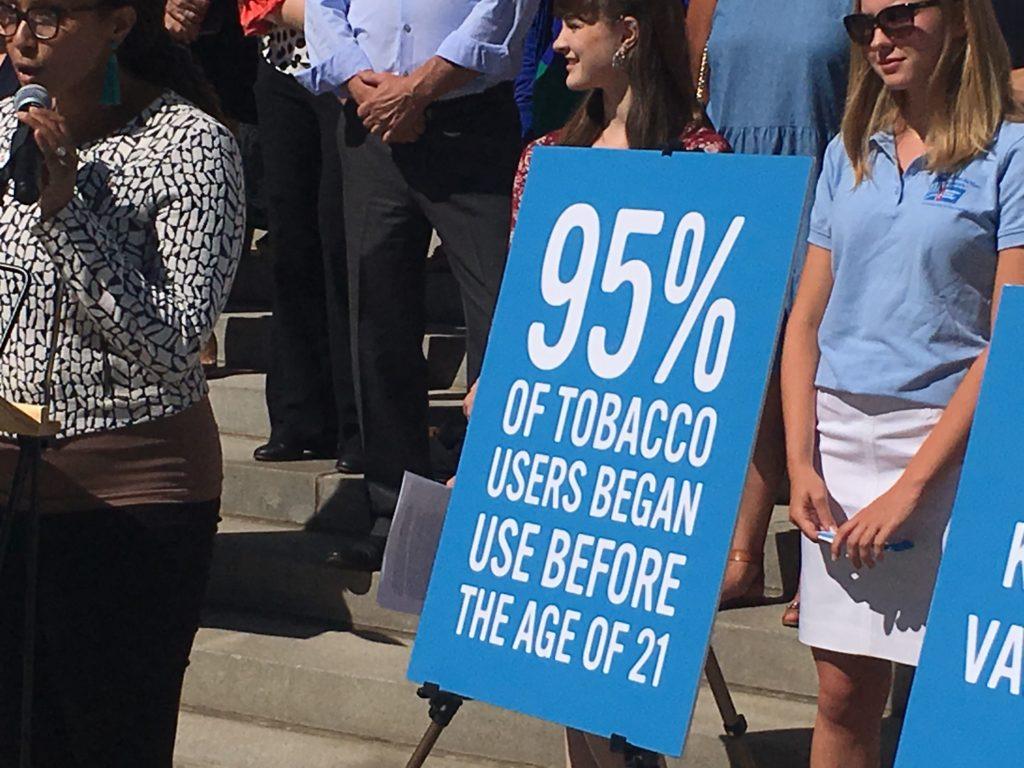
Local governments are increasingly considering and passing new rules to fight teen vaping, after state lawmakers eliminated a penalty for local tobacco rules.
Anti-tobacco measures, like tax increases, flavor bans, requiring licenses for tobacco retailers and raising the legal purchasing age from 18 to 21 are being considered in places like Denver, Glenwood Springs and Boulder.
Boulder’s city council is poised to consider both the Tobacco 21 proposal -- which would raise the legal age to purchase to 21 -- and a flavor ban Tuesday evening. It may take up retailer licensing in the coming months.
Ella Antonson, a junior at Denver East High School, spoke at a press conference Tuesday in favor of Denver's proposed reforms. She estimated half of her classmates smoked nicotine with a vaping device, like the popular JUUL.
"I see vapes in the waistband of workout clothes at field hockey. I see vapes charging in the computer at the back of a classroom. I see clouds in the bathroom in between classes,” she said.
Sedona Allen, a 20-year-old advocate who worked on a youth health council and had helped with compliance checks, spoke about the need to license retailers.
"We would go out on store audits and were shocked at how many people were selling tobacco without a license, meaning there is no accountability if they were to sell to young people,” she said. “We also discovered that the tobacco industry has their grip on so many small business owners, so we must think of how this policy can hold the industry accountable."
Colorado tops 37 other states for e-cigarette use among high school students, according to a national school-based survey by the Centers for Disease Control and Prevention.
Last session, state lawmakers passed HB19-1033, a law ensuring local governments would no longer be penalized by losing tax money for cracking down on tobacco use. For decades, state law required cities to forfeit tobacco tax money if they passed tobacco control measures like tax increases.
The push is “very much a groundswell, and a direct reaction to Colorado leading the nation in youth vaping use,” as well as the passage of the new Colorado law, said Jodi Radke, the regional director of the Campaign for Tobacco-Free Kids.
“Parents are desperately trying to manage an epidemic,” she said.
Radke has been tracking new local ordinances aimed at reducing the state’s high vaping rates. She said measures currently underway or in the works included bans on nicotine flavors in tobacco products in Boulder and Glenwood Springs, raising the legal age to purchase to 21 and tobacco retail licensing in those two cities plus Denver. Eagle County, Summit County, Pitkin County, Glenwood Springs, New Castle, Boulder, and Crested Butte are all weighing tobacco tax increases, according to Radke.
The policies would help fund tobacco prevention and cessation programs and are all evidence-based strategies that reduce use, Radke said.

“The bad news is we lead the nation in youth use rates. The good news is that we know what to do. We just need to ensure the political will exists to take bold steps to reverse this trend,” she said.
In Denver, the city council is set to consider later this month a comprehensive Tobacco 21 policy that would include a requirement retailers get a license from the city to sell tobacco products.
“We’re excited about the potential” of the ordinance to help limit youth vaping, said Naomi Amaha Gollnick, community advocacy director with the American Heart Association. She said she hoped retailers that sold tobacco to someone younger than 21 “are held accountable and getting education to ensure that they’re not doing it again.”
She also hopes city council members pass rules allowing a license to be revoked or suspended in the case of a repeat offense.
Some convenience stores and vape shops say some taxes are too high and worry the changes will hurt business.
A retail coalition of local businesses and local and state associations sent a letter to Boulder city officials expressing concern over the new proposals. The group said in the letter that the Tobacco 21 proposal “should go a long way toward reducing or eliminating the problem of youth access” to tobacco and vaping products.
But it said rather than a flavor ban, a better approach would be to require ID checks, regardless of age, for all tobacco and nicotine sales. The letter also said local rules should still allow the sale of tobacco-flavored, mint-flavored and menthol-flavored products, since those are the “primary choice of adults” who use vapor products to quit smoking conventional cigarettes.
"The board and the industry recognize the epidemic that Colorado is experiencing relative to teen vaping,” said Grier Bailey, Executive Director of the Colorado Wyoming Petroleum Marketers Association, which represents 2,200 retailers, including convenience stores. “Every study illustrates the overwhelming dominance of social sources, friends, family, schoolmates, as the primary sources for teens to get these products.”
The association is working with local government partners to come up with effective solutions, Bailey said in an email. “Some of the ordinance proposals go to fairly extreme lengths however, threatening responsible access to products by adults and harming locally owned businesses who have played by the rules and not sold to kids.”
JUUL, the dominant e-cigarette market leader, has said it backs Tobacco 21, paying for numerous ads in The Denver Post in recent months. The company has been accused by anti-tobacco advocates of targeting minors.
“We do not want non-nicotine users to buy JUUL products, and are committed to preventing underage access to our products,” said company spokesman Ted Kwong in an email. “We strongly support raising the national minimum purchasing age for all tobacco and vapor products to 21, and have implemented a comprehensive action plan to combat underage access, appeal, and use of JUUL products,” he said.








